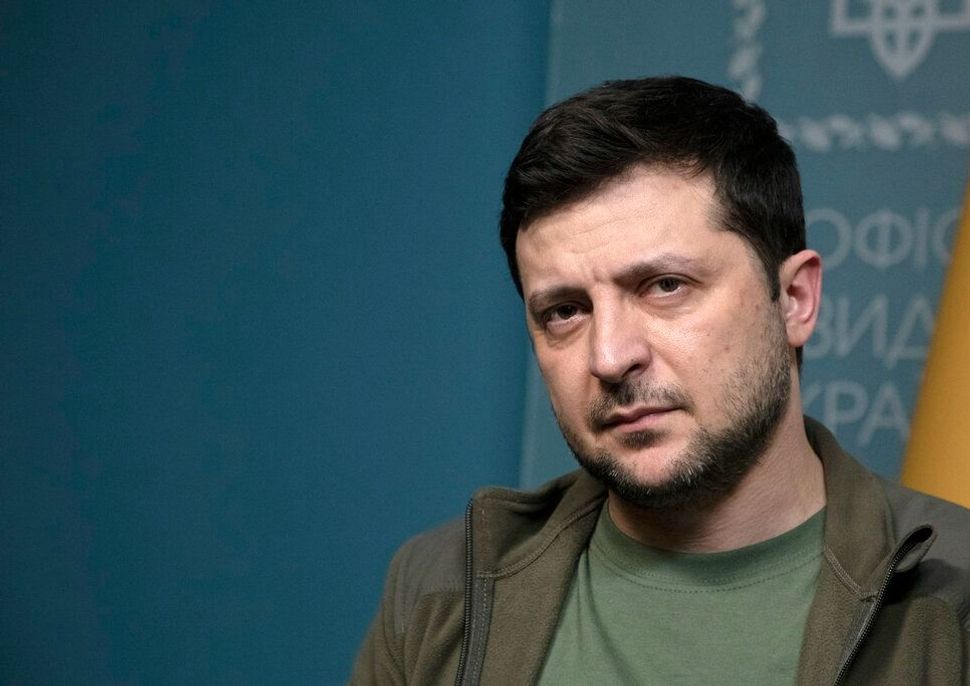‘I’m terrified for him’: American Jews hearts are tied to Zelenskyy’s fate

Image by Laurent Van der Stockt for Le Monde/Getty Images
When Stephanie Gold, a Los Angeles lawyer, read that Volodymyr Zelenskyy told European Union leaders, “this might be the last time you see me alive,” she broke down and cried.
“I’m terrified for him,” she said.
There’s something unique about the way that Zelenskyy has entered the hearts of American Jews. In a week, Ukraine’s president has gone from “Who’s he?” to family. The concern for him is intimate and visceral. And the question that shadows every conversation about the war is, What will happen to Zelenskyy?
“No man has gone from joke to legend faster,” L.A. director and screenwriter Michael Idov wrote in British GQ.
Of course, people around the world share a deep concern for Zelenskyy’s fate. But the feeling is especially strong among American Jews.
“Tonight, we celebrate Shabbat with a world that is unified in this moment, behind a Jewish president of Ukraine who comes from a grandfather who was the only son of four who survived the Holocaust,” Rabbi Ryan Bauer of Temple Emanu-El in San Francisco said in his weekly sermon.
Part of that is because, as a torrent of internet memes has established, he is a handsome and superb communicator with an improbable background: actor turned producer turned president turned leader of The Resistance, a Jew who speaks native Russian now being accused of Nazism by that same global superpower.
Get the Forward’s “Letter from California” delivered to your inbox. Sign up here to receive our lively and provocative insights, news, opinion and inspiration from the state at the leading edge of the Jewish future.
It’s a classic Jewish story that has managed to unite us in a particularly fractured moment. When Gold and her husband Geoffrey, also a lawyer, hosted their usual friendly poker night on Monday, the politically diverse guests, who often argue over Israel or former President Donald Trump, were unanimous in their support and concern for Zelenskyy.
“Every day I wake up worrying about him,” said Jacob Bass, 60, a Ukrainian Jewish immigrant who leans Republican. Bass, who immigrated to L.A. 30 years ago, said he can’t stop thinking about Zelenskyy, “because Russia wants to behead leaders.”
The worry has led to a phenomenon almost unheard of in my lifetime: Jewish unity.
In New York, Rabbi Labish Becker, executive director of the haredi Orthodox umbrella group Agudath Israel of America, told The New York Times Zelenskyy is “a source of pride” — and one reason the group was able to quickly raise $2 million for Ukraine refugee relief.
In L.A., members of Temple Israel of Hollywood, a Reform synagogue devoted to progressive causes, have also launched a fundraiser for Ukrainian refugees. Rabbi Mari Chernow said affection and admiration for Zelenskyy resonates deeply with her congregation.
“He has entered our hearts,” the rabbi said.
There was a fleeting moment of unity like this when Israeli Prime Minister Yitzhak Rabin was assassinated on Nov. 5, 1995. The following day, I was among thousands of diverse L.A. Jews who stood together at a memorial service in front of the Jewish Federation building.
We sang “Shir HaShalom,” and looking around I saw Chabadniks, Peace Now-niks, women in sheitels and women in T-shirts. A rabbi who the week before had penned an anti-Rabin opinion piece sang along somberly nearby.
It was one of those rare moments when Jews, a small and fractious people, put aside their religious and political differences and all came together as one.
But make no mistake: Rabin was far from universally loved among Jews, and his legacy can still spark angry debates.
There are no debates, on the other hand, on how Zelenskyy has faced down Vladimir Putin.
But what has turned this from simple Jewish hero worship for a man who exudes “Maccabee energy” to a matter of familial concern is that, like any deep relationship, it is mutual.
Not only did we embrace Zelenskyy, he embraced us back.
On two occasions since the invasion began, he has spoken directly to American Jews, asking them to speak out as Jews on behalf of Ukraine. “I’m asking you to help us, just support us,” Zelenskyy said in a Monday conference call with American Jewish leaders.
Earlier in the conflict, he appealed directly to American Jews, asking for them to come out as Jews, as he did, and act on behalf of Ukraine. “Do not remain silent now,” he said.
Rabin, even at his warmest, was gruff. Zelensky is the Jewish relative you have never met who throws his arms around you in the airport.
But Rabin comes to my mind not just because of what he stood for, but for the bitter memory of how he died. We have seen the movie, and we don’t want to watch it again.
Our love of Zelenskyy is wrapped up in our fear for his death. We watch him and wonder if we are witness to a cruel pre-martydom, or if, by some (Jewish) miracle, the story will have a happy ending.
The future is far from certain, and yet we choose to fill that unknowing with hope. “I can’t remember the last time I stood at this pulpit and prayed for someone’s life,” Rabbi David Wolpe said last Shabbat from the pulpit of Sinai Temple in Los Angeles, “but I pray that Zelenskyy lives.”
r























